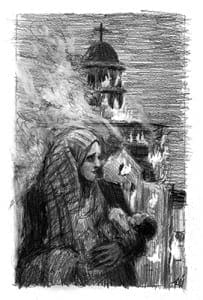‘We’re afraid of winter’
By LORRAINE V. MURRAY, Commentary | Published October 24, 2013
It’s time to unearth your fuzzy bathrobe from the closet. Time to make a pot of pungent chili and get the fireplace up and running. Yes, old man winter is on the way!
It’s a lovely season indeed for those fortunate enough to have a heated house, comfy clothing and hot food, which I’m guessing is true of most readers of this column. I’m betting most readers—just like yours truly—have a heater, some sweaters and the wherewithal to put a delicious meal on the table.
Still, many poor people dread winter with every fiber of their being because they’re not sure they’ll survive it. And when we hear about people in such dire straits, it’s easy to assume their neighborhood churches are providing blankets, medicine and food.
But what if your neighborhood church was burned down? And what if your home was, too? Then what?
This is the plight of millions of Christian families whose lives have been shattered by war and religious persecution in Egypt, Syria and Iraq. Problem is, their stories rarely make the evening news—and when they do, it’s so easy to click to the next station because scenes of frightened people huddled together in refugee camps can be depressing.
Fortunately, there are Christian charities that provide food, shelter and medicine for the ever-increasing numbers of refugees fleeing persecution by Islamic extremists. Unfortunately, these charities don’t run on angel dust.
You’ll recall that Jesus told the tale about the Good Samaritan after a lawyer asked him: “Who is my neighbor?” In the story, a man was attacked by thieves and left wounded and bloody on the roadside. Respectable people passed by and did nothing, figuring someone else would handle it. A Samaritan, however, bound up the man’s wounds and took him to an inn. He did all this for a total stranger and got no apparent reward, but he went down in history as an example of profound compassion.
Today this Good Samaritan scenario is taking place on a much larger scale. In Syria alone 2 million people have fled their homes in search of safety. Huge numbers of these refugees are children. Father Ziad Hilal works with Catholic Near East Welfare Association in the war-ravaged city of Homs, where he ministers to displaced Christians hunkering down in bombed out, filthy dwellings.
As he put it, “I bring them food, the sacraments and the hope of Christ. … Families tell me the Church is all they have.”
“We are afraid of the winter,” Father Ziad said. “We need everything to get our people through the winter: heating oil, clothing and blankets. I appeal to our fellow Christians not to forget us.”
The Good Samaritan didn’t merely pray for the man stranded on the roadside. Instead, he poured oil and wine on the man’s wounds, and paid for his lodging. None of this came cheap.
We can follow in his footsteps by donating to Catholic Near East Welfare Association (www.cnewa.org), which was founded by Pope Pius XI in 1926 as a way to bring Christ’s light to people struggling in the darkness of poverty. There is also Aid to the Church in Need—www.churchinneed.org–an international Catholic charity under the guidance of the Holy Father whose mission is helping suffering and persecuted people worldwide.
Parishes could organize Good Samaritan flea markets and festivals to help our often-forgotten neighbors overseas and send the proceeds to these charities. Children lending a hand will have a chance to grasp the true meaning of that heartfelt question: “Who is my neighbor?”
As winter approaches, let’s not forget our brothers and sisters stranded on the roadside. Let’s bind up their wounds and take them to the inn. Let’s give them that greatest gift of all, which is not just food and clothing and medicine—but hope.
